Key takeaways:
- Understanding different solar panel types, like monocrystalline and polycrystalline, is essential for optimizing efficiency and space utilization on yachts.
- Energy storage systems, particularly high-quality lithium-ion batteries, are crucial for maximizing the benefits of solar energy and ensuring reliable power supply during trips.
- Factors such as available space, local climate, and cost must be balanced carefully to choose the best solar system for a yacht’s needs.
- Personal preferences, like the aesthetic integration of solar panels and ease of use, play a significant role in enhancing the overall yachting experience.
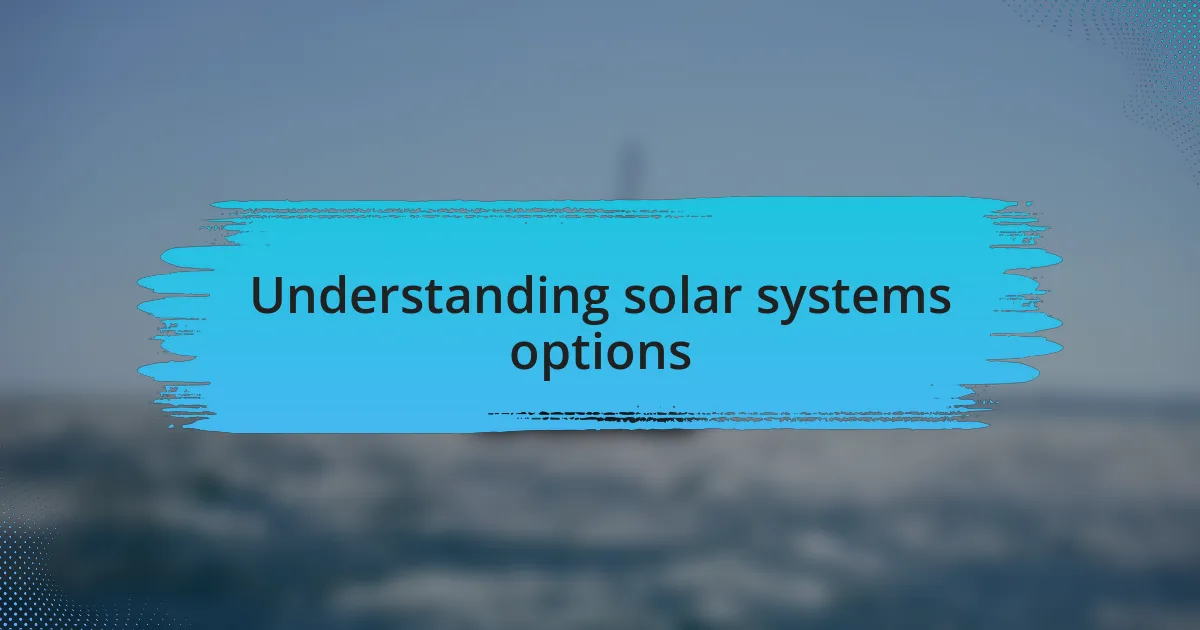
Understanding solar systems options
When considering solar systems for your luxury yacht, it’s crucial to understand the options available. You might be surprised to learn that solar panels vary significantly in efficiency and aesthetic appeal. Personally, the first time I saw sleek, integrated solar panels on a yacht, I was taken aback by how seamlessly they blended with the yacht’s design—almost like they were always meant to be there.
It’s essential to explore different types of solar systems, such as monocrystalline and polycrystalline panels. Have you ever considered how the choice between them can affect both power output and space utilization? I vividly recall a boating trip where the owner chose monocrystalline panels due to their efficiency in limited space. The performance was exceptional, allowing us to enjoy the journey without worrying about energy constraints.
Don’t forget about the importance of energy storage systems! Battery banks can make or break your sustainable setup. Reflecting on my past experiences, investing in a high-quality lithium-ion battery system can provide peace of mind, especially during those long nights at anchor. What good is a solar system if you cannot harness that energy effectively?
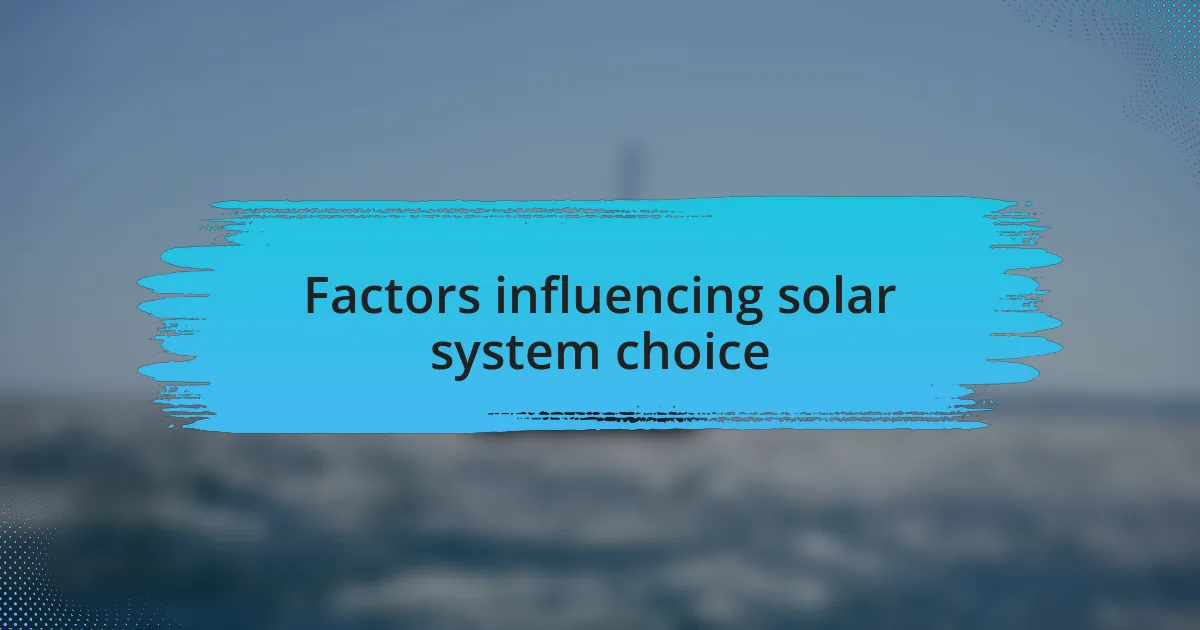
Factors influencing solar system choice
When I think about the factors that influence solar system choice, space becomes a top priority. On my journey aboard a stunning 70-foot yacht, the limited deck space forced us to be strategic about our solar panel layout. It was fascinating to see how careful planning allowed us to maximize energy production without compromising the yacht’s sleek lines.
Another critical element is the local climate where you’ll be cruising. I’ve personally had trips where I underestimated the sun’s intensity in the Mediterranean, leading to a realization: are my solar cells truly going to perform in overcast conditions? It became clear that selecting solar systems with higher efficiency ratings was essential for those less sunny days—especially when you’re out exploring remote locations.
Cost is certainly a substantial factor too. While it’s tempting to cut corners, I once learned this lesson the hard way by opting for a less expensive solar setup. The headaches of frequent maintenance and inadequate power supply became my unwelcome companions during voyages. There’s a delicate balance between budget and quality that I believe every yacht owner should meticulously consider.
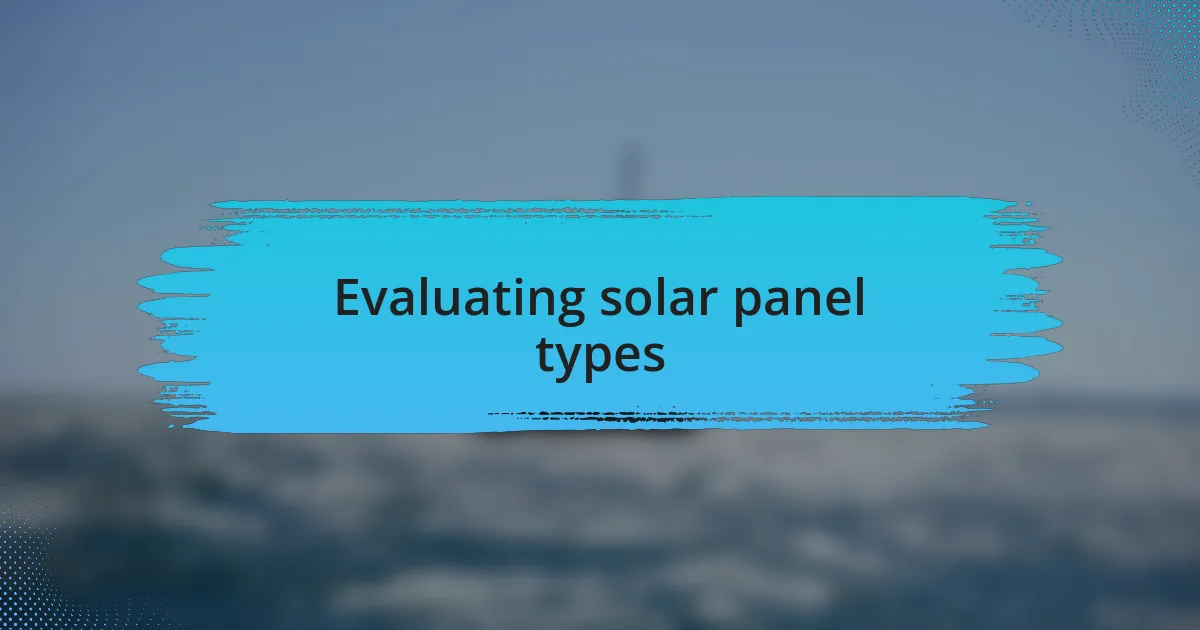
Evaluating solar panel types
When evaluating solar panel types, I’ve discovered that monocrystalline panels tend to shine in terms of efficiency. During one trip, I opted for these sleek panels, and their performance under direct sunlight was nothing short of impressive. I remember the satisfaction of watching my energy levels soar while anchored in beautiful coves, where every bit of sunlight felt like a lifeline for our adventure.
In contrast, I’ve experimented with polycrystalline panels, which are often more budget-friendly. I recall a time when I installed them, thinking I was making a smart financial move. However, the lower efficiency on that cloudy day made me wonder: was I really saving money, or simply inviting disappointment? Having experienced both types, I can confidently say that sometimes investing a little more upfront can lead to substantial rewards down the line.
Thin-film solar panels can also be a tempting option, particularly for unique installations. On one occasion, I considered their flexibility for a curved surface on my yacht. Yet, the realization hit me—while they might be lightweight and adaptable, their lower efficiency made me think twice. Sometimes, when it comes to solar solutions, practicality trumps aesthetics, and this lesson came from my personal trials at sea.
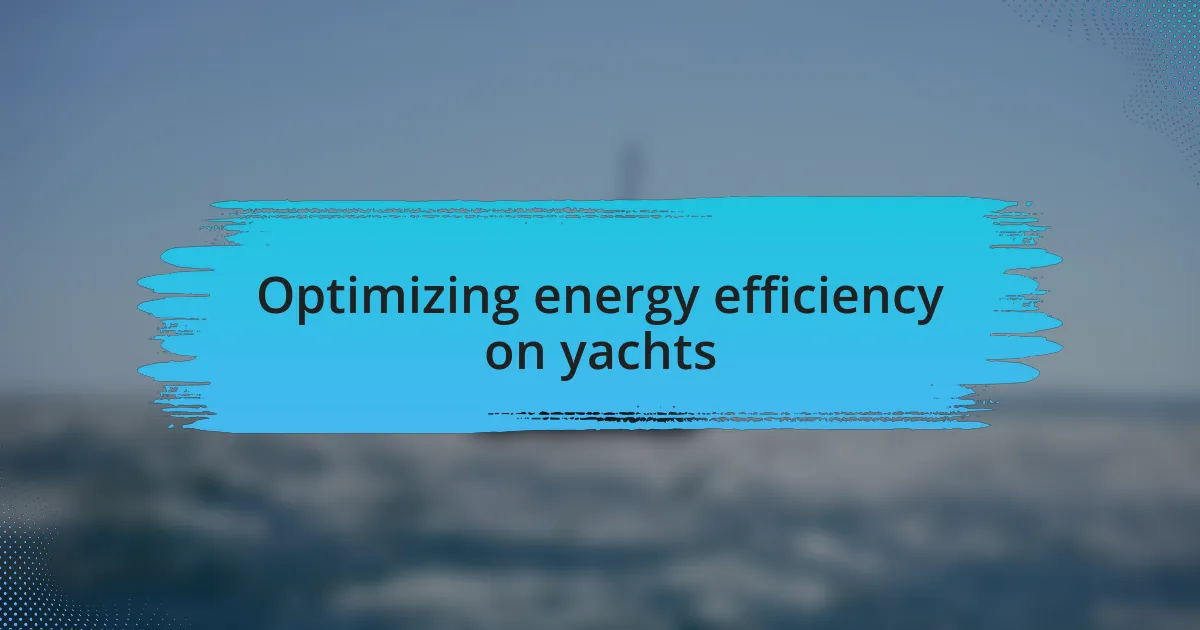
Optimizing energy efficiency on yachts
To truly optimize energy efficiency on yachts, one must also consider synchronizing systems. I once found myself aboard a yacht with a well-planned energy management system that adjusted power usage based on solar output. It felt rewarding to witness the lights dimming automatically at sunset, allowing me to savor those twilight moments without the worry of draining the battery.
Another critical component is energy storage. I vividly remember a trip where an advanced lithium battery system transformed my experience. The joy of knowing I could store excess energy generated during the day to power my evening activities was exhilarating. It made me realize how essential it is to invest in efficient storage solutions to ensure that energy is not just generated but effectively utilized.
Additionally, energy-efficient appliances can make a significant difference. On one voyage, I swapped out my traditional refrigerator for an energy-efficient model, and the impact was remarkable. Not only did it keep my provisions perfectly chilled, but it also significantly reduced my energy consumption. Have you ever experienced the delight of an upgrade that effortlessly enhances your life at sea? It’s those thoughtful choices that can make all the difference in luxury yacht living.
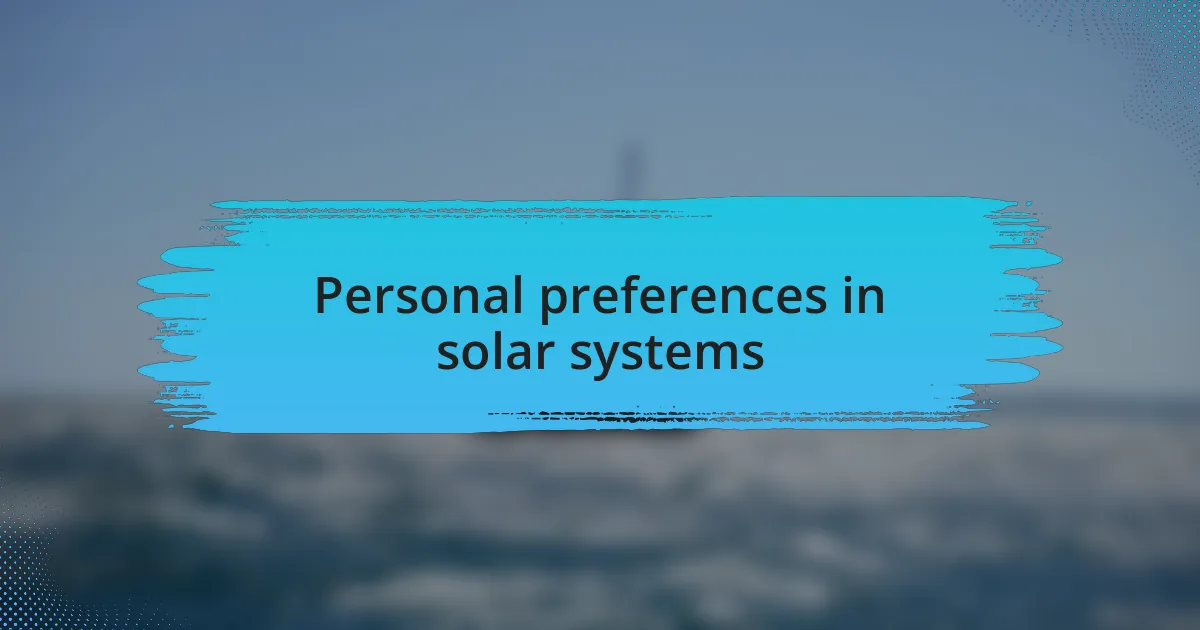
Personal preferences in solar systems
When it comes to choosing solar systems for my yacht, personal preferences play a vital role in shaping my decisions. For instance, I recall my excitement when I opted for flexible solar panels. They were lightweight and seamlessly integrated into my yacht’s design, enhancing the vessel’s aesthetics without compromising functionality. Have you ever felt that rush of satisfaction from a choice that perfectly aligns with your style?
I also find that the placement of solar panels significantly influences their efficiency. On one voyage, I decided to install panels on the upper deck, maximizing sun exposure during the day. Watching them absorb sunlight while I relaxed by the water was an absolute joy. It made me appreciate not just the energy savings but also the serene beauty of harnessing nature’s power.
Moreover, I tend to lean towards solar systems that offer a good balance between performance and ease of use. I once experimented with a monitoring app that allowed me to track solar generation in real-time. It felt empowering to have that information at my fingertips, guiding my energy choices throughout the day. Don’t you think having that kind of control enhances your overall experience on the water?
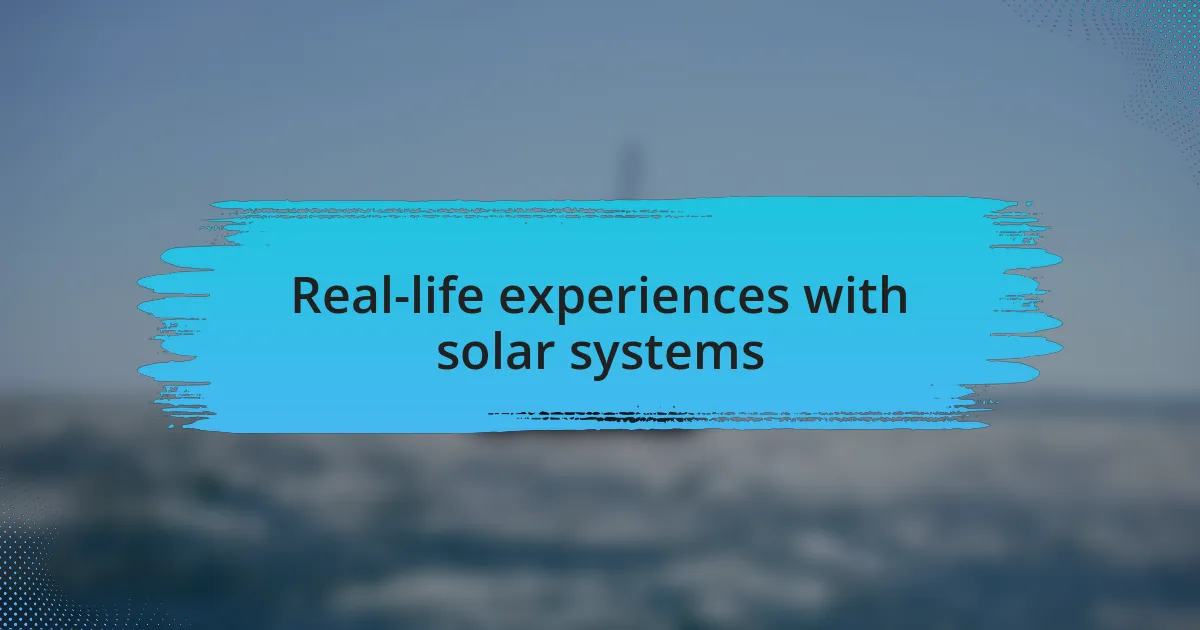
Real-life experiences with solar systems
Experiencing solar systems on a yacht can be transformative. I still remember my first long trip powered entirely by solar energy. As I sailed across the open water, I felt an incredible sense of freedom, knowing that my vessel was running on clean energy while I enjoyed the pristine blue surroundings. Have you ever had that feeling of liberation that comes from being self-sufficient?
On another occasion, I witnessed how solar systems can enhance comfort and convenience. During a sunny afternoon, while anchored in a picturesque bay, the sun-filled panels powered my fridge, keeping my drinks chilled. It was a simple pleasure, yet it made the day so much more enjoyable. Wouldn’t you agree that little comforts like this truly elevate the yachting experience?
One of the most eye-opening moments for me was during a stormy night when my conventional generators failed. The solar setup continued to deliver power without any hiccups, illuminating the cabin and providing peace of mind amidst the chaos outside. That moment reinforced my belief that investing in quality solar technology is not solely about luxury; it’s about safety and reliability too. How can you put a price on that kind of assurance?